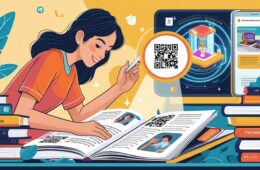
Importance of English Language Proficiency and the Role of Technology in Education
Introduction
In an increasingly interconnected and globalised world, English language proficiency has become a critical skill for academic success, professional advancement, and personal growth. As the lingua franca of international communication, English opens doors to a wealth of opportunities, enabling individuals to connect with people from diverse cultures, access information and resources, and participate in the global marketplace.
In the realm of education, English language proficiency plays a pivotal role in shaping students’ learning experiences and future prospects. It serves as the medium of instruction in many schools and universities worldwide, and proficiency in English is often a prerequisite for admission to higher education institutions and competitive programs. Moreover, English language skills are highly valued by employers across various industries, as they facilitate effective communication and collaboration in a globalised workforce.
The advent of technology has revolutionised the way we learn and communicate, and it has also significantly impacted the field of English language education. Technology offers a plethora of tools and resources that can enhance language learning experiences, making them more engaging, interactive, and personalised. From online courses and language learning apps to virtual classrooms and AI-powered language labs, technology has the potential to transform the way students acquire and develop their English language skills.
This white paper explores the importance of English language proficiency in education and the transformative role of technology in facilitating language learning. It delves into the challenges faced by learners in traditional language learning environments and examines how technology can address these challenges through innovative solutions. The paper also highlights the benefits of technology-enabled language learning, including increased engagement, personalised instruction, and improved learning outcomes. Finally, it discusses the future of English language education in the digital age and the potential of technology to create a more inclusive and accessible learning environment for all.
The Importance of English Language Proficiency in Education
English language proficiency is crucial for students’ academic success, as it enables them to:
Comprehend and engage with educational content: A strong command of English allows students to understand textbooks, lectures, and other educational materials, enabling them to actively participate in classroom discussions and complete assignments effectively.
Develop critical thinking and analytical skills: English language proficiency fosters critical thinking and analytical skills, as students learn to interpret and evaluate information, express their ideas clearly, and construct persuasive arguments.
Access a wider range of educational opportunities: Proficiency in English opens doors to a broader range of educational opportunities, including scholarships, exchange programs, and international collaborations.
Prepare for future careers: English language skills are highly sought after by employers in various industries, and proficiency in English can significantly enhance students' employability and career prospects.
Elon Musk
Challenges in Traditional Language Learning Environments
Traditional language learning environments often present several challenges that can hinder student’s progress and motivation:

- Limited speaking opportunities: Many traditional classrooms prioritise reading and writing skills, leaving students with limited opportunities to practice speaking and listening in English.
- Lack of personalised instruction: Large class sizes and limited resources can make it difficult for teachers to provide individualised attention and support to each student, leading to a one-size-fits-all approach that may not cater to diverse learning styles and needs.
- Limited engagement: Traditional teaching methods, such as rote memorisation and grammar drills, can be monotonous and demotivating for students, leading to disengagement and decreased learning outcomes.
- Lack of access to resources: Students in remote or underserved areas may have limited access to quality English language learning resources, such as textbooks, libraries, and qualified teachers.
The Role of Technology in English Language Education
Technology has the potential to revolutionise English language education by addressing the challenges of traditional learning environments and providing innovative solutions that enhance the learning experience. Some of the key ways technology can be leveraged in language learning include:
- Online courses and language learning apps: These platforms offer a flexible and accessible way for students to learn English at their own pace, providing interactive lessons, practice exercises, and real-time feedback.
- Virtual classrooms and language labs: These tools enable students to interact with teachers and peers from around the world, providing opportunities for real-time communication and collaboration in English.
- AI-powered language learning tools: These tools utilize artificial intelligence to provide personalised feedback, adaptive learning paths, and intelligent tutoring, catering to the individual needs and learning styles of each student.
- Gamification and interactive learning: Technology can be used to gamify language learning, incorporating elements of fun and competition to increase student engagement and motivation.
- Multimedia resources: Technology provides access to a wealth of multimedia resources, such as videos, podcasts, and interactive games, that can enhance language learning and make it more enjoyable.
Benefits of Technology-Enabled Language Learning
The integration of technology in English language education offers numerous benefits, including:
- Increased engagement: Technology can make language learning more interactive and engaging, capturing students’ attention and fostering a love for learning.
- Personalised instruction: Technology enables adaptive learning paths and individualised feedback, catering to the unique needs and learning styles of each student.
- Improved learning outcomes: Studies have shown that technology-enabled language learning can lead to improved learning outcomes, including increased proficiency, fluency, and confidence.
- Accessibility and flexibility: Technology provides access to language learning resources anytime, anywhere, making it more convenient and flexible for learners.
- Cost-effectiveness: Technology can offer cost-effective solutions for language learning, reducing the need for expensive textbooks and in-person classes.
The Future of English Language Education in the Digital Age
The future of English language education is intrinsically linked to the continued advancement of technology. As technology evolves, we can expect to see even more innovative and effective solutions that further enhance the learning experience. Some of the emerging trends in technology-enabled language learning include:
- Virtual reality (VR) and augmented reality (AR): These immersive technologies can create realistic and engaging language learning environments, allowing students to practice their skills in simulated real-world scenarios.
- Natural language processing (NLP): NLP can be used to develop more sophisticated language learning tools that can understand and respond to students’ natural language input, providing more personalised and effective feedback.
- Machine learning: Machine learning algorithms can be used to analyse student data and identify patterns, enabling the development of adaptive learning systems that cater to individual needs and optimize learning outcomes.
Conclusion
English language proficiency is a vital skill in today’s globalised world, and technology plays a crucial role in facilitating language learning and empowering students to achieve their full potential. By embracing technology and integrating it into English language education, we at LIQVID have create a more engaging, personalised, and effective learning experience for students, preparing them for success in the 21st century.
The future of English language education lies in harnessing the power of technology to create innovative solutions that break down barriers, foster collaboration, and make language learning accessible to all. As we continue to explore the possibilities of technology in education, we can look forward to a future where every student has the opportunity to master the English language and unlock a world of opportunities.



